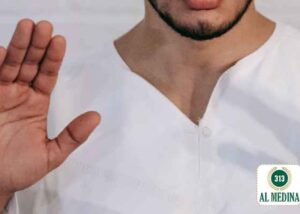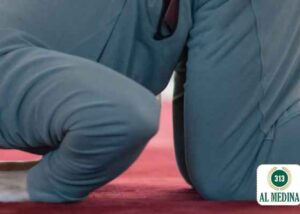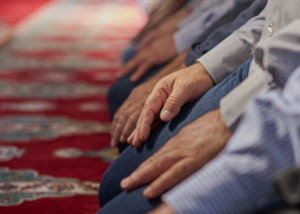Quran
Hadith
Islamic Text
بِسْمِ اللَّهِ الرَّحْمَنِ الرَّحِيمِ
In the Name of Allah Most Merciful Most Kind
Short Answer
No, raising the hands in dua is not a Bidah (an innovation). Rather, this is Sunnah. The blessed Prophet ﷺ used to raise his hands in Dua at times.
Unfortunately, there are some religious teachers that propagate the notion that raising the hands in Dua is a Bidah (an innovation). This is alarming since there are numerous authentic Hadith narrations establishing the raising of the hands in Dua as a Sunnah.
Hadith 1
نَظَرَ رَسُولُ اللهِ صَلَّى اللهُ عَلَيْهِ وَسَلَّمَ إِلَى الْمُشْرِكِينَ وَهُمْ أَلْفٌ، وَأَصْحَابُهُ ثَلَاثُ مِائَةٍ وَتِسْعَةَ عَشَرَ رَجُلًا، فَاسْتَقْبَلَ نَبِيُّ اللهِ صَلَّى اللهُ عَلَيْهِ وَسَلَّمَ الْقِبْلَةَ، ثُمَّ مَدَّ يَدَيْهِ، فَجَعَلَ يَهْتِفُ بِرَبِّهِ: «اللهُمَّ أَنْجِزْ لِي مَا وَعَدْتَنِي، اللهُمَّ آتِ مَا وَعَدْتَنِي، اللهُمَّ إِنْ تُهْلِكْ هَذِهِ الْعِصَابَةَ مِنْ أَهْلِ الْإِسْلَامِ لَا تُعْبَدْ فِي الْأَرْضِ» ، فَمَا زَالَ يَهْتِفُ بِرَبِّهِ، مَادًّا يَدَيْهِ مُسْتَقْبِلَ الْقِبْلَةِ، حَتَّى سَقَطَ رِدَاؤُهُ عَنْ مَنْكِبَيْهِ
The Messenger of Allah ﷺ looked at the idolators, and they were one thousand while his companions were three hundred and nineteen. So the Prophet ﷺ faced the Qiblah. Then he ﷺ stretched out his hands and began supplicating to his Lord: O Allah, grant me what You have promised to me. O Allah, bring about what You have promised me. O Allah if this group of Muslims is destroyed You will not be worshipped on this earth. (Sahih Muslim 1763 – 58).
In the Hadith above, we find the blessed Prophet ﷺ raising his hands during Dua.
Hadith 2
In other Hadith narrations, we find the Messenger of Allah ﷺ encouraging others to do the same (i.e., the raising of hands when making dua). Therefore, the Sunnah of raising hands during Dua is established through the action and statement of our beloved Prophet ﷺ.
عَنْ سَلْمَانَ، قَالَ: قَالَ رَسُولُ اللَّهِ صَلَّى اللهُ عَلَيْهِ وَسَلَّمَ: إِنَّرَبَّكُمْتَبَارَكَوَتَعَالَىحَيِيٌّكَرِيمٌ،يَسْتَحْيِيمِنْعَبْدِهِإِذَارَفَعَيَدَيْهِإِلَيْهِ،أَنْيَرُدَّهُمَاصِفْرًا
(Sayidina) Salman narrated, that The Messenger of Allah ﷺ said: Indeed, your Lord, Blessed and Most High, is Noble and Generous. He is reluctant to turn away empty the hands of His servant when he raises them to Him. (Sunan Abu Dawood 1488, Hasan).
وَقَدْ أَخْرَجَ أَبُو دَاوُدَ وَالتِّرْمِذِيُّ وَحَسَّنَهُ وَغَيْرُهُمَا مِنْ حَدِيثِ سَلْمَانَ رَفَعَهُ إِنَّ رَبَّكُمْ حَيّ كريم يستحى مِنْ عَبْدِهِ إِذَا رَفَعَ يَدَيْهِ إِلَيْهِ أَنْ يَرُدَّهُمَا صِفْرًا بِكَسْرِ الْمُهْمَلَةِ وَسُكُونِ الْفَاءِ أَيْ خَالِيَةً وَسَنَدُهُ جَيِّدٌ. (فتح الباري شرح صحيح البخاري)
Abu Dawud, al-Tirmidhi and others have narrated it and classed it as Hasan. The narration is by Salman, he connected it to the Prophet ﷺ: Indeed, your Lord, Blessed and Most High, is Noble and Generous. He is reluctant to turn away empty the hands of His servant when he raises them to Him. It has a Kasrah without a dot, and a Sukoon on the fa. It (Sifr) means empty. The chain of transmission is good. (Imam Ahmad bin Ali bin Hajr al-Asqalani, Fath al-Bari).
Hadith 3
Sometimes the blessed Prophet ﷺ would stretch his blessed arms to such an extent that the companions could see the illuminated armpits of the Messenger of Allah ﷺ. Thus, there is no ambiguity regarding the practice of the Prophet ﷺ raising the hands during Dua.
عَنْ أَنَسٍ، قَالَ: رَأَيْتُ رَسُولَ اللهِ صَلَّى اللهُ عَلَيْهِ وَسَلَّمَ يَرْفَعُ يَدَيْهِ فِي الدُّعَاءِ، حَتَّى يُرَى بَيَاضُ إِبْطَيْهِ
(Sayidina) Anas said: I saw the Messenger of Allah ﷺ raising his hands in Dua (supplication) until the whites of his (blessed) armpits could be seen. (Sahih Muslim 895 – 5).
The above narrations should not be taken to mean that the blessed Prophet ﷺ would always raise the hands during Dua. Rather, it occurred at times. The great companion (Sahabi) Sayidina Anas bin Malik thought it only occurred for the rain prayer. This indicates that the Prophet ﷺ would often make Dua (supplication) without raising the hands.
عَنْ أَنَسِ بْنِ مَالِكٍ، قَالَ: كَانَ النَّبِيُّ صَلَّى اللهُ عَلَيْهِ وَسَلَّمَ لاَ يَرْفَعُ يَدَيْهِ فِي شَيْءٍ مِنْ دُعَائِهِ إِلَّا فِي الِاسْتِسْقَاءِ، وَإِنَّهُ يَرْفَعُ حَتَّى يُرَى بَيَاضُ إِبْطَيْهِ
(Sayidina) Anas bin Malik said: The Prophet ﷺ would not raise his hands in any of his supplications except when praying for rain (Istisqa’). Indeed, he ﷺ used to raise them so much that the whiteness of his (blessed) armpits was visible. (Sahih al-Bukhari, 1031).
Conclusion
We see from the narrations above that the Prophet ﷺ did raise the hands during Dua at times and refrained from it at other times. Therefore, it is wrong to refer to raising the hands during Dua as Bidah (religious innovation). However, it is also wrong to claim that one must always raise the Hands during Dua. This is because the blessed Prophet ﷺ made Dua without raising the hands too.
One of the major causes of religious misunderstanding in the Muslim community is that people refuse to study with anyone outside of their own group or sect. Therefore, they end up with limited exposure to the vast tradition of Ahl al-Sunnah.
It is necessary for us to study with Sunni Muslims from different backgrounds. Not only will this lead to a broader and more correct understanding of Islam, but it will also counter the sectarianism that we suffer in our communities.
Moving away from sectarianism or groupism will save a person from clear errors, like the one highlighted in this answer. Restricting oneself to a particular sect or group inevitably leads to contradicting verses of the Holy Quran or Hadith of the Prophet ﷺ. This is because such groups tend to quote Quran and Hadith when it aligns with their views and ignore it when it undermines them.
And Allah Most High Knows Best.
–Answered by Shaykh Noorud-deen Rashid (30.11.23)






